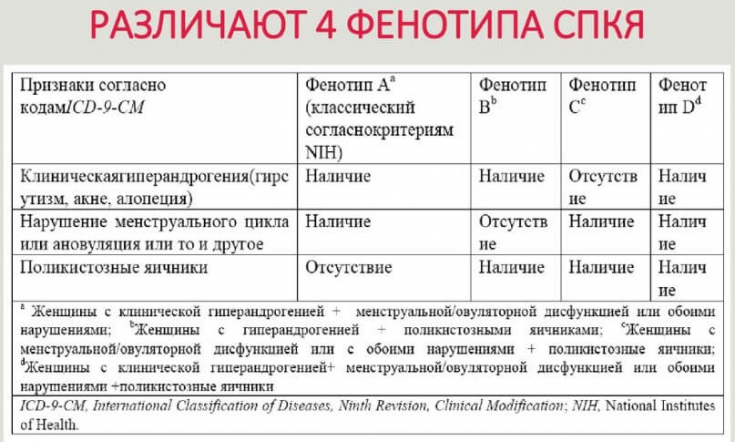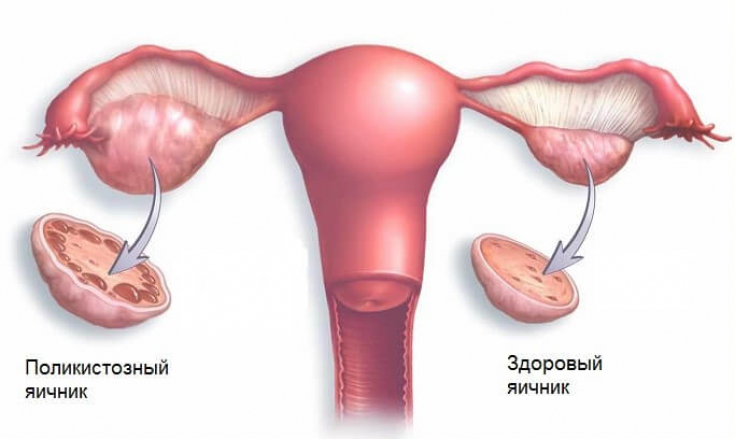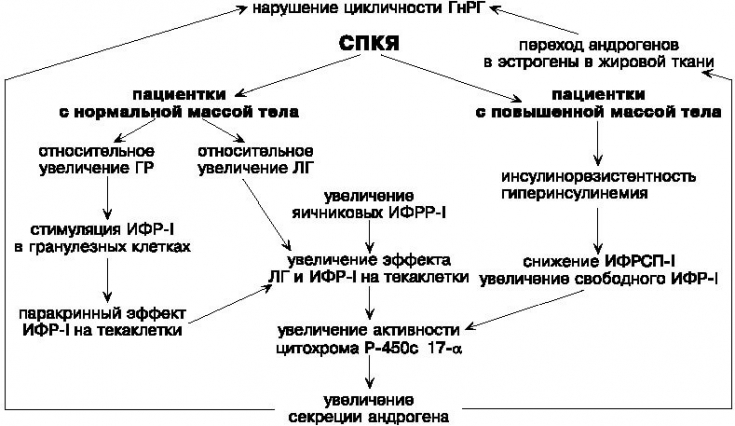Polycystic ovary syndrome (PCOS) is a common condition that affects a woman's ovaries.
PCOS has elevated levels of testosterone, luteinizing hormone (LH), and low levels of sex hormone-binding globulin (SHBG), a protein in the blood that binds to testosterone and reduces its effects.
This condition can cause infertility and increase the risk of stroke, heart attack, diabetes, and endometrial cancer.
In this regard, PCOS requires mandatory treatment, read more about it at estet-portal.com in this article.
- What is the diagnosis of polycystic ovary syndrome
- Symptoms of Polycystic Ovarian Syndrome
- Medicated treatment of polycystic ovary syndrome
- Surgical treatment of polycystic ovary syndromein
Based on the diagnosis of polycystic ovary syndrome
3 main features of PCOS (if the patient has at least 2 of them, she can be diagnosed with PCOS):
- irregular menses – ovulation occurs irregularly;
- excess androgen - high levels of "male" hormones in the body can cause hirsutism;
- polycystic ovaries - the ovaries are enlarged and contain many fluid-filled follicles that resemble cysts (hence the name of the syndrome).

Polycystic ovaries contain a large number of follicles up to 8 mm in size. These follicles are underdeveloped sacs in which eggs develop.
In PCOS, they are often unable to release an egg, which means that ovulation does not occurt.
Ovarian cancer treatment: what methods are used today
Symptoms of Polycystic Ovarian Syndrome
Symptoms of polycystic ovary syndrome usually become apparent before the age of 20.
These may include:
- irregular or no periods;
- pregnancy problems due to irregular ovulation;
- hirsutism;
- weight gain;
- thinning and hair loss;
- oily skin, acne.
PCOS is also associated with an increased risk of health problems later in life, such as type 2 diabetes, high cholesterol, and high blood pressure. The disease can be accompanied by depression and mood swings.
The exact cause of PCOS is not known, but often is familial.This suggests that there may be a genetic link to PCOS, although the specific genes associated with this condition have not yet been identified.

The disease is associated with an imbalance in the body's hormone levels, including high levels of insulin.
Many women with PCOS are resistant to the action of insulin, resulting in excessive insulin production, which in turn leads to increased production and activity of hormones such as testosterone.
Testosterone interferes with the development of follicles and interferes with normal ovulation.

Overweight or obesity also increase testosterone levelsa.
How obesity affects the development of polycystic ovary syndrome
Medicated treatment of polycystic ovary syndrome
If the PCOS patient is overweight, weight loss and proper balanced nutrition can improve the clinical picture of the disease.
- Irregular or absent periods
Birth control pills may be recommended to achieve regular menses. It will also reduce the long-term risk of developing uterine lining cancer.

- How to get pregnant with polycystic ovary syndrome
PCOS is often accompanied by pregnancy problems. However, with the right treatment, most women with this diagnosis are able to get pregnant.
A drug called clomiphene is usually the first PCOS drug recommended for women who are trying to get pregnant.
Clomiphene promotes the monthly release of an egg from the ovaries (ovulation).
If clomiphene does not promote ovulation, another medication called metformin may be recommended.
Metformin is often used to treat type 2 diabetes, but it can also lower insulin and blood sugar levels in women with PCOS.
In addition to inducing ovulation and reducing the risk of miscarriage, metformin may also have other long-term health benefits, such as lowering high cholesterol and lowering the risk of heart disease.
Letrozole is sometimes used to induce ovulation instead of clomiphene. However, this drug is licensed for the treatment of breast cancer, it is not licensed for the treatment of PCOS.
Another treatment option for PCOS – gonadotropin injections. But, it is important to remember that they can over-stimulate the ovaries and lead to multiple pregnancies.
The most important information about PCOS
- Unwanted hair growth and hair loss
Medications to control excessive hair growth (hirsutism) and hair loss (alopecia) include specific types of combined oral contraceptives:
- cyproterone acetate;
- spironolactone;
- flutamide;
- finasteride.
These drugs work by blocking the effects of "male hormones" such as testosterone, and some also suppress the ovaries' production of these hormonesand.
A drug such as orlistat may be recommended for weight loss, and statins are prescribed for PCOS in patients with high blood cholesterol.
Read the most interesting articles in Telegram!
Surgical treatment of polycystic ovary syndrome
If PCOS is not treatable with medication, the patient may be advised to surgical therapy for the disease.
Wedge ovarian resectionprocedure is performed using a laparoscope. In parallel, the doctor has the opportunity to eliminate other possible causes of infertility.
If necessary, coagulation of endometriosis foci, removal of paraovarian cysts, myomectomy, salpingo-ovariolysis, separation of adhesions.After the procedure, testosterone and luteinizing hormone (LH) levels decrease and follicle-stimulating hormone (FSH) levels increase. This contributes to the normalization of hormonal imbalance, and the restoration of normal ovarian function.
You may also be interested in:
Ovarian Dermoid Cyst: Remove or Not







Add a comment